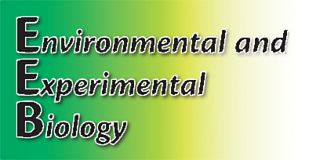
On-line: ISSN 2255–9582

| Faculty of Biology, University of Latvia | ||||||

|
Hard copy: ISSN 1691–8088
On-line: ISSN 2255–9582 Env Exp Biol (2011) 9: 61–69
|
|||||

|
About the Journal | Retractions | Open Access | Author Guidlines | Current Issue | Archive |
|
Environmental and Experimental Biology |
Env Exp Biol (2011) 9: 61–69 |
The interest in cultivated plants that produce high-quality raw materials with a wide application spectrum has increased. The aim of the present study was to determine the impact of different doses of nitrogen fertilizer on physiological processes of hemp plants and to evaluate its effect on several yield parameters, including seed and fiber yield and quality. The efficiency of different nitrogen supply was evaluated both in controlled and field conditions using hemp cultivar of Latvian origin ‘Pūriņi’, possibly suitable for local conditions. Yield parameters of hemp in field conditions varied both by years and by treatments. Additional nitrogen supply had positive effect on plant height, while no siginificant difference between various doses of nitrogen supplied was observed. Additional nitrogen supply had negative effect on hemp fiber content in 2008 and 2009, and no significant effect in 2010. Seed yield ranged from 1050 to 2557 kg ha–1, depending both on particular climatic conditions and the rate of additonal fertilization. The yield significantly increased in the N+60 treatment in all years in comparison to control plants. Hemp seed oil content was not significantly affected by additional nitrogen fertilization. A high proportion of linoleic acid in hempseed oil was found, followed by α-linolenic acid, oleic acid and palmitic acid. In laboratory conditions, increase in both leaf nitrogen concentration and chlorophyll content in hemp plants, additionally fertilized with nitrogen, did not depend on the particular dose. Additional nitrogen fertilization significantly affected different aspects of photochemistry of photosynthesis, as shown by chlorophyll a fluorescence analysis. According to yield data, the hemp cv. ‘Pūriņi’ is well-suited for both seed and fiber production in temperate conditions.